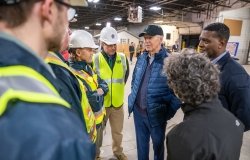Social Dimensions of REDD+: Current Practices and Challenges
Experts come together to discuss the social dimensions of Reducing Emissions from Deforestation and Forest Degradation (REDD) as a climate mitigation scheme, with special focus on gender dynamics, effectiveness, and equality.
Overview
Agenda
8:30 Registration
9:00 Coffee and Informal Reception
9:30 Welcome to Woodrow Wilson Center’s Environmental Change and Security Program by Paolo Sotero
9:40 Brief Overview of Experts’ Workshop Purpose and Outcomes by Diane Russell, USAID Biodiversity and Social Science Specialist
Introduction of Alexandria Panehal, Deputy Assistant Administrator, USAID’s Bureau for Economic Growth, Agriculture and Trade (EGAT), by Diane Russell
10:00 Introduction of USAID’s Deputy Administrator Don Steinberg by Alexandria Panehal
10:05 Gender and REDD+ - Remarks by USAID Deputy Administrator Steinberg
10:15 Taking a Gender Perspective - Presentation of Workshop Outcomes by Jeannette Gurung of Women Organizing for Change in Agriculture and Natural Resource Management (WOCAN) – and short Q&A moderated by Deputy Administrator Steinberg
10:45 Introduction of USAID’s Global Climate Change Coordinator Kit Batten by Alexandria Panehal
Remarks by Kit Batten on the Social Dimensions of the US Government REDD+ Strategy
11:00 Presentation of Workshop Outcomes:
Enhancing REDD+ Outcomes (Effectiveness and Efficiency) by Michael Richards, Forest Trends
Enhancing REDD+ Equity, Democracy and Governance by Xiaoting Hou, The Forest Dialogue
11:30 Plenary Discussion
12:30 Lunch
1:30 Update on REDD+ SES and other processes by Joanna Durban, CCBA Coordinator and others
2:30 Topic for Further Discussion: Where and How Can we Best Focus our Efforts to Move Ahead?
Discussion groups (coffee available all afternoon) – organized around roles of different types of actor, i.e., donors, NGOs, researchers, etc.
3: 30 Groups Report Back to Plenary and Final Discussion
5:00 Close Forum
Speakers
Hosted By

Environmental Change and Security Program
The Environmental Change and Security Program (ECSP) explores the connections between environmental change, health, and population dynamics and their links to conflict, human insecurity, and foreign policy. Read more
Thank you for your interest in this event. Please send any feedback or questions to our Events staff.










